Infectious Diseases
Category: Abstract Submission
Infectious Diseases: Potpourri
544 - Assessing Inclusion, Diversity, Access, and Equity in the Pediatric Infectious Diseases Society
Sunday, April 24, 2022
3:30 PM - 6:00 PM US MT
Poster Number: 544
Publication Number: 544.328
Publication Number: 544.328
Jessica Snowden, Arkansas Children's Hospital, Little Rock, AR, United States; Matthew Kronman, University of Washington School of Medicine, Seattle, WA, United States; Tina Q. Tan, Northwestern University The Feinberg School of Medicine, Chicago, IL, United States; Kristina A. Bryant, University of Louisville, Louisville, KY, United States; Anthony R. Flores, UTHSC/McGovern Medical School, Houston, TX, United States
- JS
Jessica Snowden, MD (she/her/hers)
University of Arkansas for Medical Sciences
Little Rock, Arkansas, United States
Presenting Author(s)
Background: Recent reports indicate < 20% of Pediatric Infectious Diseases Society (PIDS) members constitute groups underrepresented in medicine (UiM). In 2020, PIDS created the Inclusion, Diversity, Access, & Equity (IDA&E) Task Force to identify opportunities to improve UiM representation within the organization.
Objective: Assess UiM demographics and attitudes within PIDS.
Design/Methods: In August 2021, PIDS distributed an anonymous online survey to its membership. The survey collected information about member demographics and included both Likert-scale and open text questions about their professional experiences being judged based on their personal characteristics (gender, race/ethnicity, age, sexual orientation, international status) rather than their work. Results are presented as descriptive statistics with Chi-square analyses for significant differences.
Results: 24.6% (309/1257) of PIDS members responded to the survey; 271 members answered at least one question based on their experiences being judged for a personal characteristic rather than their work. Of these, 44% (118/271) reported being judged based on at least one personal characteristic rather than their work, with 58% of those reporting being judged based on more than one characteristic. Overall, 26% of respondents had been judged based on their gender, with African American (41%) and multiracial (50%) respondents reporting this more often. Younger faculty (instructors, 50%; millennial, 33%) and those with primarily educational roles (45%) were also more likely to report being judged based on gender. 15% of respondents had been judged based on their race or ethnicity, with international medical graduates (IMG; 25%), and African American (59%), and Latinx (31%) members all significantly more likely to report this. Many IMG (37%) and members born outside of the United States (32%) reported feeling judged based on their international status and their citizenship (18%, 17% respectively). Conclusion(s): Many members of PIDS reported professional experiences in which they were judged based on personal characteristics rather than the quality of work and this was more commonly reported by our younger members, those identifying as an underrepresented minority or an international medical graduate, and those with educational roles. There is increasing evidence that these biases and experiences influence professional success and career satisfaction, highlighting the importance of proactively improving medicine’s culture of diversity, equity, and inclusion.Presented on behalf of PIDS & PIDS, IDA&E Taskforce
Table 1: Member experiences being judged on personal characteristics rather than work
Objective: Assess UiM demographics and attitudes within PIDS.
Design/Methods: In August 2021, PIDS distributed an anonymous online survey to its membership. The survey collected information about member demographics and included both Likert-scale and open text questions about their professional experiences being judged based on their personal characteristics (gender, race/ethnicity, age, sexual orientation, international status) rather than their work. Results are presented as descriptive statistics with Chi-square analyses for significant differences.
Results: 24.6% (309/1257) of PIDS members responded to the survey; 271 members answered at least one question based on their experiences being judged for a personal characteristic rather than their work. Of these, 44% (118/271) reported being judged based on at least one personal characteristic rather than their work, with 58% of those reporting being judged based on more than one characteristic. Overall, 26% of respondents had been judged based on their gender, with African American (41%) and multiracial (50%) respondents reporting this more often. Younger faculty (instructors, 50%; millennial, 33%) and those with primarily educational roles (45%) were also more likely to report being judged based on gender. 15% of respondents had been judged based on their race or ethnicity, with international medical graduates (IMG; 25%), and African American (59%), and Latinx (31%) members all significantly more likely to report this. Many IMG (37%) and members born outside of the United States (32%) reported feeling judged based on their international status and their citizenship (18%, 17% respectively). Conclusion(s): Many members of PIDS reported professional experiences in which they were judged based on personal characteristics rather than the quality of work and this was more commonly reported by our younger members, those identifying as an underrepresented minority or an international medical graduate, and those with educational roles. There is increasing evidence that these biases and experiences influence professional success and career satisfaction, highlighting the importance of proactively improving medicine’s culture of diversity, equity, and inclusion.Presented on behalf of PIDS & PIDS, IDA&E Taskforce
Table 1: Member experiences being judged on personal characteristics rather than work

